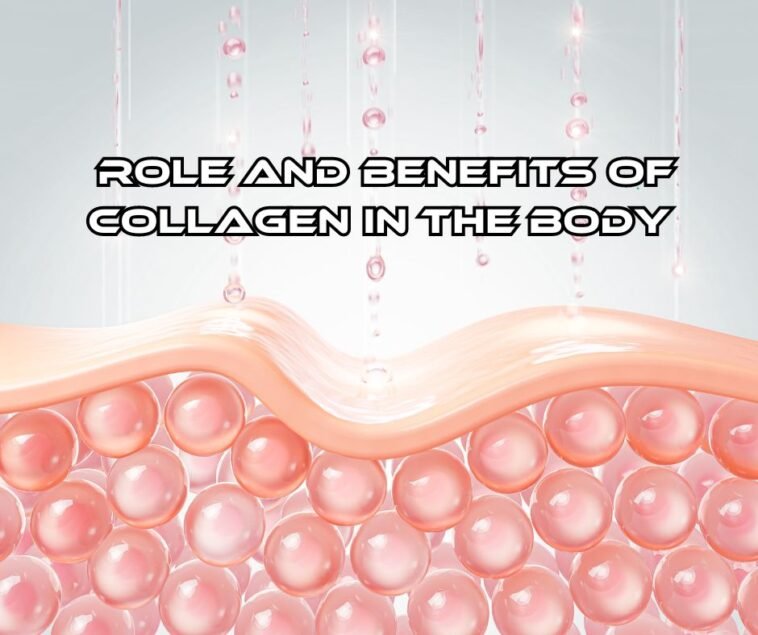“Increasingly, individuals incorporate collagen supplements into their daily routines, blending collagen powder into beverages such as coffee, tea, or smoothies, with the aim of enhancing the well-being of their skin, joints, and hair.
Despite the rising popularity of collagen supplements and related products, many remain unfamiliar with the nature and roles of collagen within the body.
This article delves into the essentials of collagen, encompassing its definition, internal functions, and the benefits associated with collagen supplementation, providing a comprehensive understanding of this vital protein.”
Why is collagen vital and what does it do?
Collagen represents a class of proteins, serving as the predominant structural protein in mammals. Structural proteins are essential components that form the framework of cells and tissues.
Currently, 28 types of collagen have been identified, with type I collagen constituting 90% of the collagen found in the human body.
The primary components of collagen are glycine, proline, and hydroxyproline, which form the majority of this protein. These amino acids are arranged in a triple-helix structure, composed of three strands.
Collagen is present in connective tissue, skin, tendons, bones, and cartilage. It provides structural support to tissues and plays a vital role in various biological functions, including tissue repair, immune response, cellular communication, migration, essential for tissue maintenance.
Fibroblasts, connective tissue cells, are responsible for the production and maintenance of collagen. Aging leads to collagen fragmentation, reduced fibroblast activity, and diminished collagen synthesis.
These age-related changes, along with the decline of elastin (another crucial structural protein), contribute to symptoms like sagging skin and wrinkles.
Uses of Collagen
The body naturally produces collagen, which can also be obtained from dietary sources such as fish, chicken skin, and supplements.
Oral and topical collagen treatments, including supplements and face creams, are popular for addressing aging symptoms like wrinkles, skin dehydration, and joint discomfort.
Collagen is available in liquid, pill, and powder formats.
It can be taken as a supplement or mixed into both hot and cold beverages, as well as foods like oatmeal, yogurt, and energy balls.
In the medical field, healthcare professionals utilize collagen and collagen-based products, particularly in the management of burns, wounds, and diabetic ulcers.
What causes a loss of collagen?
As you age, your body’s natural collagen production diminishes, leading to a breakdown and wider dispersion of collagen. These changes contribute to common signs of aging, such as wrinkles, sagging, and dry skin. The integrity of collagen in the skeletal system also deteriorates with age, impacting bone strength.
While the decline and loss of collagen are inevitable with aging, several dietary and lifestyle factors can accelerate this process.
For example, smoking is known to degrade collagen, leading to skin aging, wrinkles, and reduced elasticity.
Excessive alcohol consumption has been shown to accelerate skin aging by inhibiting collagen formation and impairing skin repair processes.
Furthermore, a diet high in processed foods and added sugars can expedite aging by promoting glycation, a process that hinders collagen turnover and disrupts collagen’s ability to interact with other proteins and cells in the body.
To prevent premature signs of skin aging, wearing sunscreen and limiting prolonged sun exposure are crucial, as excessive sun exposure diminishes collagen production.
Best sources of collagen in food
Collagen is found in all animals, primarily concentrated in the skin and joints.
Here are some examples of foods rich in collagen:
- Animal bones, skin, and ligaments, such as pig knuckles, chicken skin, and jellyfish. Products like bone broth and fish skin also contain collagen.
Since collagen is synthesized by your body from amino acids, ensuring an adequate intake of protein from sources like poultry, fish, beans, and eggs can promote collagen formation.
Apart from amino acids, your body requires other dietary components for collagen synthesis and maintenance.
For instance, vitamin C is essential for collagen synthesis, and insufficient levels of vitamin C can impact collagen production. Including foods high in vitamin C in your diet can support collagen development. Consider citrus fruits, peppers, leafy greens, and berries.
Moreover, a diet rich in beneficial plant compounds can improve skin health by reducing inflammation and safeguarding collagen from degradation.
Does consuming collagen supplements have any advantages?
Studies suggest that there could be benefits to using collagen supplements, particularly in relation to skin health.
Skin Benefits:
One of the primary uses of collagen supplements is to support skin health. Research indicates that collagen supplementation may improve skin health and appearance in various ways.
In a review of 19 studies involving 1,125 participants (95% women) aged between 20 and 70, the consumption of hydrolyzed collagen, a common type of collagen used in supplements, was found to enhance skin hydration, elasticity, and reduce wrinkles compared to a placebo.
Hydrolyzed collagen is produced through a process called hydrolysis, where the protein is broken down into smaller fragments, facilitating better absorption by the body.
Several studies have suggested that collagen supplementation can boost skin moisture, elasticity, and decrease the visibility of wrinkles.
It is important to note that many of these studies were supported by companies manufacturing collagen products, which might have influenced the outcomes.
Effective collagen doses for improving skin health vary in trials, with most studies utilizing doses ranging from 2.5 to 15 grams per day for a duration of 8 weeks or longer.
Possible advantages for bones
Collagen supplements may offer additional benefits beyond improving aspects of skin health and appearance.
Bone Health:
A study investigated the impact of collagen supplements on 102 postmenopausal individuals with low bone mineral density (BMD). Those who consumed 5 grams of collagen peptides daily for a year exhibited significant increases in BMD in the spine and femur compared to the placebo group.
A follow-up study involving 31 of these women who took 5 grams of collagen per day for a total of 4 years showed a gradual increase in BMD. Over the follow-up period, participants experienced a BMD increase of 5.79-8.16% in the spine and 1.23-4.21% in the femur. These findings suggest that long-term collagen supplementation may help improve bone mineral density in postmenopausal women vulnerable to osteopenia and osteoporosis.
Osteoarthritis Symptoms:
A review study indicated that oral collagen supplements reduced osteoarthritis symptoms like stiffness in participants.
Body Composition:
Collagen supplementation, when combined with resistance training, may enhance body composition in certain populations.
It’s important to note that these studies primarily focused on elderly women with low bone mineral density to assess the potential positive effects of collagen ingestion.
Are there any adverse effects to collagen supplements?
Collagen supplements have a generally positive safety profile and are not typically associated with adverse side effects.
However, it’s common for manufacturers to combine collagen with other substances in dietary supplements. Supplements containing herbs and high concentrations of vitamins, especially those aimed at enhancing skin, nails, and hair health, may pose risks to your well-being.
Some ingredients in these supplements, such as herbal extracts, might interact with prescription medications or be unsafe for pregnant or nursing women.
Furthermore, certain collagen supplements may contain elevated levels of minerals like biotin, which could interfere with thyroid and heart function lab tests.
Consistent consumption of high doses of these vitamins and minerals over an extended period could lead to health issues.
While supplements containing only collagen are generally safe, it is essential to carefully read labels and understand the potential risks of supplements that include additional ingredients alongside collagen.
Before starting a supplement regimen, consult a healthcare provider, especially if you are taking other medications, are pregnant, or are nursing.
Supplemental collagen versus protein
It’s important to note that preserving collagen levels and bone health doesn’t necessarily mandate the consumption of collagen or collagen supplements.
In reality, ensuring a diet rich in high-quality proteins, along with adequate intake of vitamin D, calcium, vitamin C, and zinc, can promote the body’s natural collagen production and help maintain healthy collagen levels and bone integrity.
For the maintenance of bone and muscle mass as you age, a balanced diet slightly elevated in protein can be particularly beneficial. Experts recommend consuming more protein than the minimum daily intake of 0.36 grams per pound (0.8 grams per kilogram) of body weight.
To complement a protein-rich diet, incorporating exercise, especially weightlifting and resistance training, is highly recommended to support bone and muscle health.
How to stop collagen loss
Slowing down the natural loss of collagen with age is challenging but possible with certain lifestyle choices and dietary habits.
Diet and lifestyle factors play a significant role in collagen production and maintenance. Here are some key points to consider:
- Diet Impact: A diet high in ultra-processed foods and added sugars can negatively affect collagen formation. Conversely, a nutrient-dense diet can support collagen production and skin health.
- Harmful Habits: Smoking and excessive alcohol consumption can accelerate collagen degradation and aging symptoms like wrinkles.
- AGEs and Skin Health: Advanced glycation end products (AGEs) can accumulate in the skin, impairing collagen repair and causing collagen hardening. Foods high in AGEs include fried foods, processed meats, and grilled meats.
- Supportive Foods: Consuming a diet rich in high-quality protein and plant foods, such as fruits and vegetables, can provide nutrients that support collagen production, protect collagen, and potentially slow down collagen breakdown and loss.
By making informed dietary choices, avoiding harmful habits, and prioritizing a healthy lifestyle, it’s possible to support collagen maintenance and overall skin health as you age.
Summary
Collagen, a crucial protein found in cartilage, skin, tendons, bones, and connective tissue, plays a vital role in tissue repair, cell signaling, and structural support for tissues in the body.
While your body naturally produces collagen, you can also increase your collagen intake through supplements and specific foods, potentially enhancing the health of your skin, bones, and other body parts.
Studies suggest that collagen supplementation can offer specific benefits for certain conditions and demographics, such as increasing bone mineral density in postmenopausal women with low BMD.
A well-rounded diet that includes adequate amounts of zinc, vitamin D, vitamin C, and protein provides a healthy and cost-effective alternative to supplements. Coupled with regular exercise, this approach can help reduce collagen and bone loss as you age.
Although age-related collagen decline is inevitable, maintaining a healthy lifestyle can mitigate its effects, slow down the aging process, and contribute to overall well-being.
Please Subscribe Us to get updated with Qatar News, Saudi News, Kuwait News, Health News, UAE News, Iqama, Visa, Jobs, Banking and More.. before the full time



